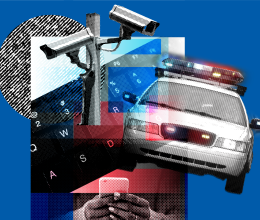Mr. Kenyatta is a prisoner rights activist and businessman who was released from prison 13 years ago. He spent time in solitary confinement at both of Ohio’s maximum-security prisons and was part of the ACLU lawsuit, Austin v Wilkinson, which drastically changed prisoner classification in Ohio to ensure more humane living conditions. He has been on the board of directors at the Ohio Justice & Policy Center and CURE-Ohio, and is a published author.
I was 18 when I was sentenced to prison. I spent time at Lucasville and at Ohio’s maximum-security prison, Ohio State Penitentiary. I was locked down all day. The only thing I looked forward to was mail. It’s nice to keep something coming in to break up the days.
The routine for Monday through Friday was one-hour of recreation five times a week in individual recreation cages and 10-minute showers five times a week. The showers were run by opening each prisoner’s cell, one at a time, and letting us walk to the shower stalls at the front of the range. Most people took their time going to and from the shower, socializing, and collecting books and newspapers from other prisons on the range. Anything to avoid going back into that cell because once you did, that was it for the rest of the day, for 23 hours a day. To us, showers became a major event. It was something that we looked forward to.
For rehabilitation, sometimes they had you watch videos or read something and turn in tests after, but it wasn’t very helpful. If you did it, you got credit that counted toward your review. I kept myself busy reading and writing. I was able to keep to myself busy and stay engaged, but people with mental illness are not equipped to handle solitary. It destroys them. There’s not really a good place in prison to deal with the mentally ill.
All you really hear are the horror stories of people not making it on the outside. I would think when someone was released, they’ve really got it together, and then they ended up back in prison. As I approached my release date, it was scary.
“When I was released, it was like being in a foreign country. You don’t know what everybody else knows.”
The 23-hour a day isolation had its effects on everybody in one way or another, except for me that is, or at least I thought, until I got released and had a real hard time having people around me. I was released in 2002. After signing all the necessary paperwork and collecting the little funds I had in my account, I was taken in a van to the Greyhound bus station. This is the first time I had been in a motor vehicle without being handcuffed, shackled, and belly chained in a long time. After messing with the phone for a while, I soon realized that this phone was not like the phones in prison or like the pay phones I remember using before my incarceration.
When I was released, it was like being in a foreign country. You don’t know what everybody else knows. How much is the bus fare? Where can I go to get my license? How to operate a touch screen? What’s going on in the world? There’s no road map for how to be on the outside.
Also, you lose any social status you had in prison. If you had a high social status and people looked up to you, like a leader, you lose that instantly upon release. Sometimes people cannot adjust to this. It’s hard to translate what you learned and translate those experiences to the outside world. There should be more programs for people being released where they can listen to advice from people who made it on the outside.
I remember one person used to have 8-track tapes and wouldn’t give them up or trade for something better because he wanted to have them for when he was released. If people in prison could have better access to the outside with more visitors, they would adjust better. They need access to what’s going on in society.
This post is part of the joint report between Disability Rights Ohio and the ACLU of Ohio – “Shining a Light on Solitary Confinement: Why Ohio Needs Reform.” Take action to reform solitary confinement in Ohio.
Kristen Henry, Abuse & Neglect Team Leader, Staff Attorney, Disability Rights Ohio; Andrew Brennan, Staff Attorney, Disability Rights Ohio; Adrienne Gavula, regional director, ACLU of Ohio







